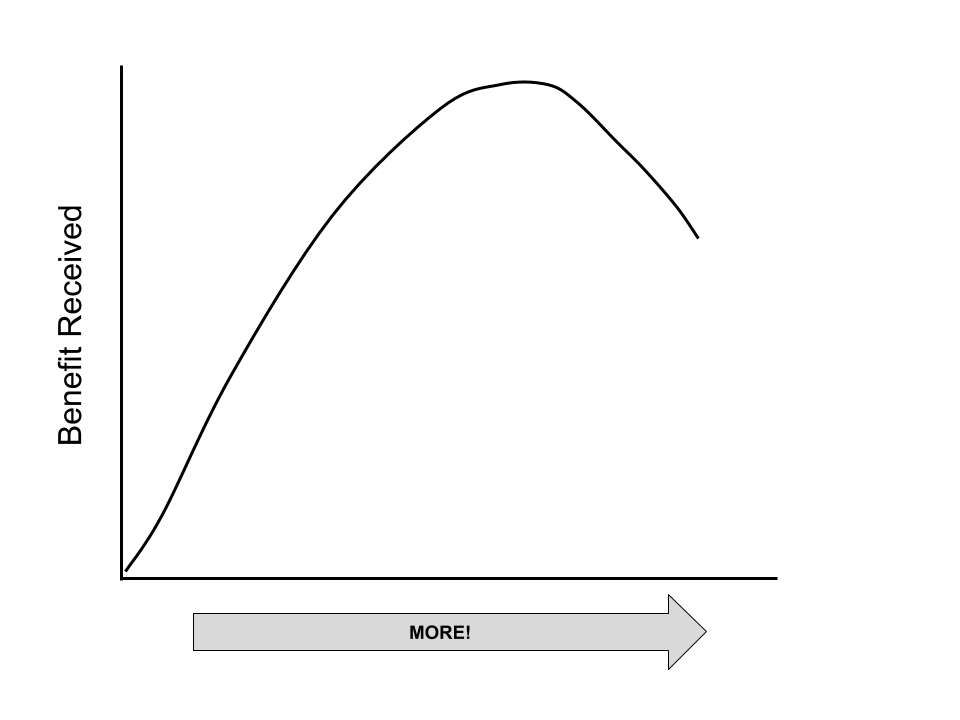If something is good, then more of it is even better – right? Wrong!
When studying economics or production theories in business, students will learn about the law of diminishing returns.
It’s a simple concept – Adding more input will only provide a positive benefit to a certain point, then additional input will begin to have a negative effect.
In other words, more is not always better. When you start to add too much of something, you begin to cause more harm than good. You’ll begin to receive less return from each incremental investment.

In business, we consider the law of diminishing returns when we are doing things like determining how many people to assign to a task, or how much money to invest in a campaign.
There are some obvious examples in everyday life too. One or two cups of coffee is great. But how about six?
Then there are some less obvious examples of diminishing returns in our life. Things that seem like adding more will always better, but are actually not.
Examples of Diminishing Returns in Our Life
Clothing – More clothing means more to choose from! We can be more fashionable! Except at a certain point, your closet becomes cluttered, and you can’t find the shirt you are looking for. Suddenly, the volume of clothing you own begins to become a burden.
Luxury Items – A little bit of luxury allows you to enjoy some of the finer things in life. Luxury is great in small quantities in areas that matter to you most. But as you increase the amount of luxury you have, you begin to need luxury in your life (instead of enjoy it), and the cost of your lifestyle inflates.
Technology – Adding some technology products in your life can help improve your productivity, and help simplify by doing more with less. But at a certain point, when everything you own is “smart”, it becomes a burden to manage.
House Size – A lot of people dream of having a larger home. But like everything else, there is a point where adding more square feet stops benefiting you. With larger mortgage debt and more to maintain, a bigger home is not always better.
Where The Benefit Ends
If you find yourself in a situation where you want more of something, stop and consider if it will actually benefit you. Are you at the point of diminishing returns?
Asking this question can be one method of determining when you have “enough” of something.
I think that over time a person naturally receives less enjoyment in a given activity. I attribute this to the newness factor and law of diminishing returns. Almost everything I have ever done in my life that seemed incredible at first eventually diminished as I continued to do it. I could never get the same level of excitement that accompanied the early days of doing whatever it was. Physical intimacy is a prime example. Other examples: Competing and winning in athletic pursuits. Eating food. Movies. Books. Friends. You name it and think about it…your enjoyment over time diminishes relative to a peak point in whatever it was that you once loved doing. I’m sure there are exceptions to this rule…the enjoyment of a relationship can continue to improve over time…the enjoyment of a career or endeavor can continue to improve over time. But even within these areas there will come a peak point in time that afterwards the enjoyment level will start to diminish. The one possible exception being the personal relationship with another person in rare circumstances(my personal opinion).
Thanks for sharing Ken! You bring up some points on hedonic adaptation in general.
I do agree with your comments. It is a sobering realisation that whatever we may discover as a wonderful and fulfilling experience will reach a maximum point of satisfaction and go no further, and will often then decline. One method to counteract this, I find, is to alternate practise of pursuits one enjoys – this seems to keep the interest alive, though not with the same original enthusiasm. This won’t work with the personal relationship of course, that has to evolve into a mutual enjoyment of each other’s company.
Yes, that’s a great suggestion Helen! Keeping things “fresh” helps with this. And as an added bonus, it allows you to expand your knowledge into new areas of life.
Living SIMPLE